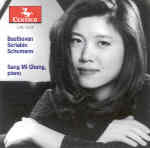Born in 1965, pianist Sang Mi Chung studied at Juilliard with Adele Marcus and Martin Canin. She’s a teacher in her own right (at New York’s Hunter College), although the booklet notes say next to nothing about her performing career. She captures the improvisatory spirit Beethoven implies in the first movement of his Op. 109 sonata with an excellent sense of timing and transition. By contrast, the third-movement variations seem overly literal and perfunctory in effect, especially in all manners of trills–yet the central-movement Prestissimo’s inner lines are uncommonly clear.
Chung’s Scriabin etude selections are technically solid but musically unconvincing. Her heavy, emphatic touch in Op. 8 No. 2 straitjackets the music’s darting urgency, while the famous D-sharp minor piece from the same set (Op. 8 No. 12) runs its course on the same emotional and dynamic level. Similarly, Op. 43 No. 5 sounds flat and undifferentiated next to Horowitz’s immense textural diversity and impassioned, arching melodic projection. In the Schumann/Liszt Widmung, the vocal line and accompaniment interweave in choppy, confusing perspective next to Van Cliburn’s long-lined control. Happily, the G major sonata fares better as far as kinetic energy and clear voice-leading are concerned.
My main criticism here (and for the Beethoven) is that Chung tends to build the music’s volatile climaxes with more emphasis in the right hand than in the left hand, an observation underlined by Centaur’s excellent engineering. Given the considerable recorded competition and Centaur’s less-than-generous 50-minute playing time, it’s best to look at this release as a calling card.
































